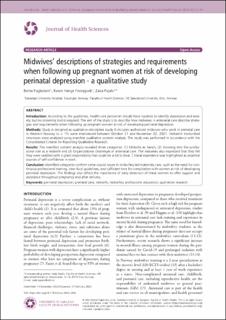| dc.contributor.author | Fuglestein, Bente | |
| dc.contributor.author | Fredagsvik, Karen Vange | |
| dc.contributor.author | Pajalic, Zada | |
| dc.date.accessioned | 2023-06-07T11:25:35Z | |
| dc.date.available | 2023-06-07T11:25:35Z | |
| dc.date.created | 2023-03-05T08:17:34Z | |
| dc.date.issued | 2023 | |
| dc.identifier.citation | Journal of Health Sciences. 2023, 13 (1), 12-19 | en_US |
| dc.identifier.issn | 1986-8049 | |
| dc.identifier.uri | https://hdl.handle.net/11250/3070353 | |
| dc.description | This is an Open Access article distributed under the terms of the Creative Commons Attribution License (https://creativecommons.org/ licenses/by/4.0/), which permits unrestricted use, distribution, and reproduction in any medium, provided the original work is properly cited. | en_US |
| dc.description.abstract | Introduction: According to the guidelines, health-care personnel should have routines to identify depression and anxiety, but no screening tool is required. The aim of the study is to describe how midwives in antenatal care describe strategies and requirements when following up pregnant women at risk of developing perinatal depression.
Methods: Study is designed as qualitative descriptive study. It includes authorized midwives who work in prenatal care in Western Norway (n = 11) were interviewed between October 21 and November 02, 2021. Verbatim transcribed interviews were analyzed using manifest qualitative content analysis. The study was performed in accordance with the Consolidated Criteria for Reporting Qualitative Research.
Results: The manifest content analysis revealed three categories: (1) Midwife as haven, (2) Growing into the professional role as a midwife and (3) Organizational challenges in antenatal care. The midwives also expressed that they felt they were saddled with a great responsibility that could be a lot to bear. Clinical experience was highlighted as essential sources of self-confidence in work.
Conclusion: Identified categories confirm some crucial issues in midwifery-led maternity care, such as the need for continuous professional training, clear local guidelines, and sufficient time for consultation with women at risk of developing perinatal depression. The findings also reflect the importance of early detection of these women to offer support and assistance throughout pregnancy and after delivery. | en_US |
| dc.language.iso | eng | en_US |
| dc.publisher | University of Sarajevo. Faculty of Health Studies | en_US |
| dc.rights | Navngivelse 4.0 Internasjonal | * |
| dc.rights.uri | http://creativecommons.org/licenses/by/4.0/deed.no | * |
| dc.subject | qualitative research | en_US |
| dc.subject | midwifery professional education | en_US |
| dc.subject | midwifes | en_US |
| dc.subject | prenatal care | en_US |
| dc.subject | perinatal depression | en_US |
| dc.title | Midwives’ descriptions of strategies and requirements when following up pregnant women at risk of developing perinatal depression - a qualitative study | en_US |
| dc.type | Peer reviewed | en_US |
| dc.type | Journal article | en_US |
| dc.description.version | publishedVersion | en_US |
| dc.rights.holder | © 2023 Bente Fuglestein, et al.; licensee University of Sarajevo - Faculty of Health Studies | en_US |
| dc.source.pagenumber | 12-19 | en_US |
| dc.source.volume | 13 | en_US |
| dc.source.journal | Journal of Health Sciences | en_US |
| dc.source.issue | 1 | en_US |
| dc.identifier.doi | 10.17532/jhsci.2023.2052 | |
| dc.identifier.cristin | 2131228 | |
| cristin.ispublished | false | |
| cristin.fulltext | original | |
| cristin.qualitycode | 1 | |

